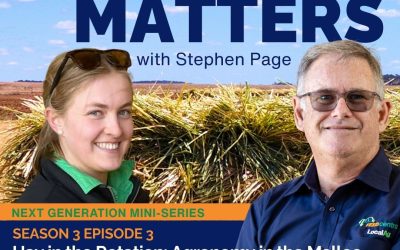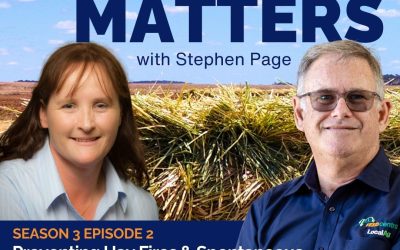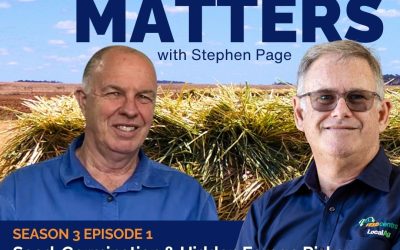Podcast Highlights
In the latest episode of Hay Matters, brought to you by LocalAg and Feed Central, Steve Page catches up with Harry Divall; hay contractor, grower and AFIA board member. Harry shares his path from livestock work in Goulburn to running a growing hay operation across West Wyalong, Stockinbingal, and Crookwell. He shares the ups and downs of learning how to make quality hay, how he manages seasonal risk, and what he hopes to contribute to the fodder industry.
Harry left school early and started fencing and working cattle near Goulburn before setting up a mixer on the family farm to boost weight gains in steers and heifers
Cold conditions limited hay production at home, so his family expanded west and bought their first baler, a Massey 2270XD, in 2016
He now operates two Krone balers and produces between 15,000 and 25,000 bales a year, depending on the season
With farms spread across Goulburn, Stockinbingal and West Wyalong, he uses geography to manage weather risk and extend the cutting window from September to January
Crop rotations include oats, barley and vetch out west, with canola, oats, barley and lucerne on the Stockinbingal farm
Harry adjusts his plan each year, converting crops to silage or grain when conditions aren’t right for hay
Shed storage now holds over 2,000 bales, but he’s also experimenting with tarping, aiming to protect quality from the bottom up
As a new AFIA board member, Harry wants to make learning resources more visual and hands-on, helping others see what good practice looks like in the paddock
Read Transcript
[00:00:23] Steve Page:
It is Steve Page here from Feed Central and LocalAg, and I’m here at the AFIA conference on the Gold Coast for 2025.
And this morning I’ve got Harry Divall with me and Harry’s farm is down around the West Wyalong region and we’ve associated with him for a few years now. He’s one of last year’s National Hay Award winners, I believe. And yeah, just want to have a chat to you, Harry.
Welcome and what can you tell us about your operation?
[00:00:50] Harry Divall:
Yeah, g’day, Steve. Thanks very much for having me. , Originally, I’m from Goulburn and it’s quite a cold state. Or a cold, what is it? A cold area, isn’t it? So anyway, started down there, working through school and just knew school wasn’t for me.
I wanted to get out as soon as I could. Went roust-abouting for two months while I was still at school just to get away from it. And when I got home, I said to mum and dad, I said. I just don’t see that I’ll be going back. And they said, righto. Well if you’re not going go back, you need to get on the farm and, and start making, working towards a goal.
So I got off the farm and spent a couple years around Goulburn fencing, doing livestock with got 600 Angus cattle down there that way. So I spend a lot of time in the yards. Learning all about that side of things. slowly getting a passion for it. It seems for me that I, any direction with agriculture, I, I find passion.
So the livestock was the first stop for me. And then we, we end up purchasing a mixer and starting to maximize on our steers and heifers. Weight gains down there are quite difficult in a paddock because everything’s so cold. So we were looking for any way we could to try and to push those numbers to get them out the door sooner.
With that we knew that we needed some feed to put through the mixer and we weren’t able to produce any hay in Goulburn for being so cold. It was, every now and then we’d get lucky and might be able to make something, but for the most part, we needed somewhere a warmer climate, so we pushed out to. A farm that my pop had at Stockinbingal to start working towards that.
Dad bought our first Massey 2270 XD in 2016. Got on to that and that’s where I found my next passion. slowly working out how to, how to make hay and going through the struggles and it, it was a struggle and from time to time it still is. So, It sort of evolved into there. I started spending more and more time at Stockinbingal producing the feed out that way.
And it sort of just spiralled from there really. We’re, we’re now growing into an operation. We’ve got two crone one six and one eight string baler. And we’re producing sort of anywhere from. 15 to 25,000 bales a year depending on the, on the year. And with the gear that we were getting to try and push our operation along, I knew that we needed to offset ourselves a little bit and expand.
So, we started doing a bit of contracting for the local area. And you know that that’s difficult from time to time as well, but it’s. I really enjoy trying to help people and trying to make a difference. And anyway, I could do that. That’s what I was trying to do. Yeah, so that’s, that’s pretty well it at, at this point.
[00:04:01] Steve Page:
So, Harry’s and since you’ve started doing hay, what have been your major learning points since you’ve started and where you see it going in the future?
[00:04:10] Harry Divall:
Yeah, so. Definitely. Just trying to make the hay between the weather has always been difficult. There’s a lot of talk goes around of making that quality hay and to make quality hay. You can’t have that rain get on it and gone through the motions of cutting it, thinking there’s no rain coming. And then a week later the forecast completely changed and we’re dealing with rains. And trying to, to work through that and work out what works. We’ve been playing around with tedders and different row sizes to see what works and what we can still manage to hold some quality, even with the weather that comes through.
It’s been a roller coaster. There’s, there’s no doubt about it. It’s such, such a short time to try and get on my feet and, and learn it. And I’ve still got an awful lot to learn about it. There’s no doubt about that. Every year is a new year and a new challenge.
[00:05:41] Steve Page:
So, what crops do you grow and what rotations do you have for your cropping?
[00:05:45] Harry Divall:
So on our Western farm, we do a rotation of oats, barley, vetch on a three year rotation. It’s something that we’ve incorporated in the last. Two years. So we haven’t quite had a full rotation yet. We grew our first lot of vetch last year, and that was really exciting. It, it went surprisingly really well for us.
It’s a hard, hard crop to grow and something that we’re still trying to learn about a bit more. And then on our Stockinbingal farm. We are doing a canola, oats, barley, and then a legume, which we’ve been for the last sort of seven years, putting a lucern in for three or four years. And then back into our rotation after that.
[00:06:34] Steve Page:
So where do you see yourself going? You’ve obviously gone more into hay in the last few years. Do you see that progressing? How are you spreading your risks on those rain events and that type of thing?
Are you looking at you know, spreading your risk through grain crops and, and different varieties and everything like that? I take it?
[00:06:53] Harry Page:
Yeah, absolutely. So, With our oats, if the condition’s not gonna suit, we’ll push more towards a silage.
Because of the, the cutter we’ve got at home, we’re able to play around with that a little bit and push that feed into the mixer. And with our barley, it’s quite seasonal as well. If the conditions are not. Stacking up when we’re getting to that point where we want to cut, we’ll start pushing some paddocks to grain and then just start to stagger our, our cutting times to try and account for anything that might be coming.
And then our vetch is very much an opportune crop for us. We’re happy to see it. Just go to a. What, what do they call it?
[00:07:42] Steve Page:
The green manure?
[00:07:42] Harry Divall:
Yeah, green. That’s it.
[00:07:44] Harry Divall: Dry, dry feed to the ground. Yep. ‘Cause we’re really chasing that nitrogen fix and, and soil health from that plant for sure.
[00:07:52] Steve Page:
Yep. Okay. so you are also spread over a reasonable sort of geographical area too, so that would assist with your events, your rain events and that, or you see it just sort of that rain event keep coming across on you?
[00:08:04] Harry Divall:
Yeah, no, absolutely. So driving between farms, it’s incredible to see the difference with what a an hour or even a couple hours drive can do.
At West Wyalong and Stockinbingal farm, more often than not, a chalk and cheese, there’s always one farm is wetter than the other, or vice versa. And then going down into Goulburn, we get to the, the range at Gunning and the conditions will just change completely. You go from a beautiful sunny day to clouds and dew and moisture, and it’s always wet down in Goulburn.
If you want to get cold and wet, that’s where you go. And then we’ve got places at Crookwell and Taralga as well, and they sort of push to be more cold there again. But it pushes our seasons a lot later down there. So we, we could be making hay. In January down in Goulburn, Crookwell, Taralga. So it’s certainly our first cut around the middle of September, and our last cut could be right through to the middle of January.
[00:09:12] Harry Divall:
Mm.
[00:09:13] Steve Page:
And shed space. You’ve got sheds for what you’re producing or how do you store it and what’s your marketing, how are your marketing systems working for you?
[00:09:21] Harry Divall:
With our storage, we’ve got one shed at West Wyalong which has got a capacity of 750 bales.
We’ve got three sheds at Stockinbingal with a capacity of 1500 down there. So we’ll make sure that we fill all those sheds before we start paddock stacking Tarping hay is Something that we got into last year that I found quite successful. There’s some things that I want to change. I, I would like to start plastic tarping from the bottom to the first bale, even in the paddock.
Because I couldn’t believe the quality that was coming out of these stacks just from doing the top tarp. So, just trying to stop the moisture coming in from the bottom as well. I think that we’re quite promising going forward for us. Obviously, sheds are king, but it all comes down to cost. At the end of the day, as we’re still growing, as fast as we are shed’s stuff that we’re looking into sort of 3, 4, 5 years down the track, we’ll just slowly keep building those sheds to make sure we get that hay under them.
[00:10:29] Harry Divall:
Mm-hmm. Yeah.
[00:10:29] Steve Page:
Yeah. Just congratulations too. You’re now on the board of AFIA. That was a great achievement for you and what do you hope to achieve in there and, what your learnings from there.
[00:10:40] Harry Divall:
Yeah, thank you. No, it’s really, really exciting and I really appreciate everyone that’s supported me and allowed me to take this journey.
I really want to progress on what AFIA has already accomplished. I’d like to see it AFIA become the go-to place for information and be able to lay out that information to all our members in a handful of different ways, whether it’s videos or writing’s done on the way people have made hay or silage.
I think that everyone learns differently. Me in particular, I’m a visual learner. I like to see it out in the paddock. And I watch YouTube videos and I, I think that there’s a lot of people out there that are much the same that would learn from that. So, I’d like to push towards that a little bit.
[00:11:37] Steve Page:
All right. Thank you very much Harry. Lovely to catch up with you again and hopefully see you later in the season.
[00:11:42] Harry Divall:
Awesome. I really appreciate it, Steve. Thank you.
[00:11:48] Steve Page:
Thank you for listening to the Hey Matters podcast. If you’re interested in sponsoring the podcast or getting your brand in front of our national audience of 20,000 plus Farmers, growers, and agribusinesses, get in touch with the team at Feed Central to find out how.
This podcast is proudly presented by Feed Central and LocalAg. Stay tuned for upcoming episodes.




